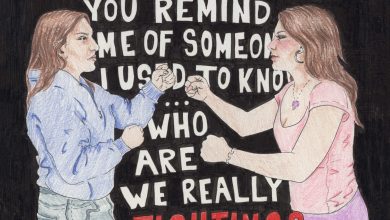Why Isn’t Anybody Talking About This?

Design by Sophia Pulido
Image description: Eight lines of italic text alternating between black and red on a pink background, reading “Why isn’t anybody talking about this?”
We do not have the news habits of previous generations. In addition to traditional media, we are constantly plugged in through news apps and social media. Headlines drop down through push notifications and disseminate in thousands of retweets. News dissemination is now an unavoidable function of social media. As we continuously scroll through apps designed to keep us engaged, we watch a dizzying kaleidoscope of virtue signalling, malicious redirection, peer pressure, and genuine good-faith intent to spread awareness. The highlight reel of the worst of the world is embedded in every corner of our consciousness. Bad news is both immediate and omnipresent.
“WHY ISN’T ANYBODY TALKING ABOUT THIS” accompanies a photoset that probably requires a content warning. Here, at your fingertips, is another problem you cannot do anything about. Regardless of intention or authenticity, another enraging social issue reaches across the screen and tugs –– hard –– at the guilt in your stomach.
Social media is the realm of appearances, a curated feed of outward projections of what we should be that has leached into every aspect of how we interact online. “Why isn’t anyone talking about this?” screeches, “I’m more aware than you” more than it does, “here is how to help.” Sometimes, it talks over the people who have been talking about it. While there is some merit in how it can potentially raise awareness, this effect is fleeting. What can we do? Who should be held accountable? Was there enough information to ask these questions in the first place? Don’t forget to like, share, and retweet.

Sharing, whether or not the information is useful, is often where action ends. What follows is either paralyzing frustration by an inability to do more or self-congratulations for partaking in socially acceptable activism. Simplistic sharing of vague, superficial outrage breeds apathy on either side of the spectrum.
These posts and their passionate “voice for the voiceless” tones offer little more than simple awareness and rely on their audience to verify their content. While it can be argued that an audience should be, on their own, critical of what they consume, a post that claims to raise awareness should actually raise awareness. Instead, it can function as nothing more than virtue signalling. Like a headline without an article, The Thing That Nobody Is Talking About is vaguely provocative. It often contains photos without context, reactions without verifiable information, and little to no action. In a recent step forward, petitions and link compilations have started to appear beneath the initial posts. However, in places where petitions alone are often meaningless and politicians co-opt donations like they do taxes, the impact of these additions is questionable.
We want to feel like we are making a difference. When we share this content, it can feel helpful without actually helping. It is peer pressure, one degree removed from your aunt’s Facebook post: “share if you care about xyz.” It does not convince us to do research or to take action, but pressures us to share lest we be accused of apathy. Social media has created a culture that necessitates proof regardless of action: you are what you post.

Online activism has its own functions and activists around the world make use of it in various ways, spreading vital information to a broad audience. In many places, even vague dissent online can lead to prosecution. However, a new breed of “online activism” has also become trendy. From #BLM decorating usernames to celebrities and influencers posing at protests, advocacy or the appearance of caring has become social currency.
Capitalism and its insistence on measuring a person’s value by their labor has created a “hustle culture” that glorifies nonstop exertion regardless of the quality of that work. It commodifies activism –– both as an aesthetic (a discussion all on its own) and as a genuine effort –– and shifts our focus from cooperation to individual achievement. It rewards the appearance of advocacy without critical engagement, pressuring people to agree with their circles instead of to learn alongside them. On the other hand, it demands an inhuman amount of work to justify humanly necessary rest: a self-martyrdom that benefits the individual, if anyone at all.
Internet culture demands far more social awareness than it has before. While an increase in social awareness is objectively a good thing, this culture expects a constant outward expression of that awareness. Why don’t you care about everything going on all the time?
There are days when it seems every problem from every corner of the earth is battling for attention. Each problem needs that attention, that is why it landed on social media in the first place, and each deserves to be heard. However, after the share (sometimes a donation, sometimes a petition), we feel hopeless for not knowing what to do, guilty for not doing anything, helpless as we watch it all happen anyway.
The pressure to uphold the image of caring is not equal. The thousands of likes ask, if you care about intersectionality, why don’t you care about what’s happening halfway across the world? Ironically, we ask more of people who are already doing the work of learning/unlearning than we do of people who have not started.

We want to care, especially about groups that echo our own communities’ struggles, but to ask ourselves to know it all is unrealistic. We cannot tangibly aid any of them if we are busy trying to know everything, everywhere, all the time. Being ignorant of some injustice elsewhere is not a personal failing. Nobody in your circle is talking about it because nobody knew. There is a difference between a productive amount of awareness and debilitating information overload.
Information-seeking and engagement with deep-rooted social issues as well as the people most vulnerable to them is still necessary. No change is possible without continuous and active education. Solidarity, after all, is fundamental in collective action and intersectionality. No problems exist in a vacuum, and to treat them like they do does not help to the people fighting to solve them. We need to stay informed, but we also need to be able to process that information and to exist within our own lives. It is true that most people do not have the luxury of looking away long enough to “process” the bad news that impacts them first and hardest. However, this does not mean that it is wrong to need time and space to process all the appalling things that need attention.
The attention-grabbing, virtue signaling, “awareness-raising” posts are passionate enough to look almost like activism. But these have the potential to detract from advocacy by creating an environment of helplessness instead of action, and cynicism instead of hope. We are not built to know all of human suffering without some idea of how to fix it. Thus, spreading awareness necessarily comes with spreading solutions (and yes, demanding accountability from specific groups is action). As large as the world is, every problem comes with a group already working to solve it. It is important to amplify their calls and listen to their accounts instead of spreading our outrage.
At the end of the day, having the time to think about how knowing exhausts you is a privilege. It is still our responsibility to inform ourselves and to build our own capacities to critically take in information about the world we exist in. At the same time, it is your responsibility to do so in such a way that you continue to learn, grow, and act in service of advocacy beyond yourself. It is ultimately a disservice to your and other communities to be so burnt out that your knowledge of their struggles becomes a reason you cannot listen. It is not an individual’s responsibility to solve every problem they see, but it is theirs to amplify the calls of a collective. It is not your job to change the world, but it is your job to try. And trying requires you to maintain the capacity to listen.




